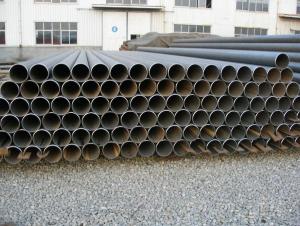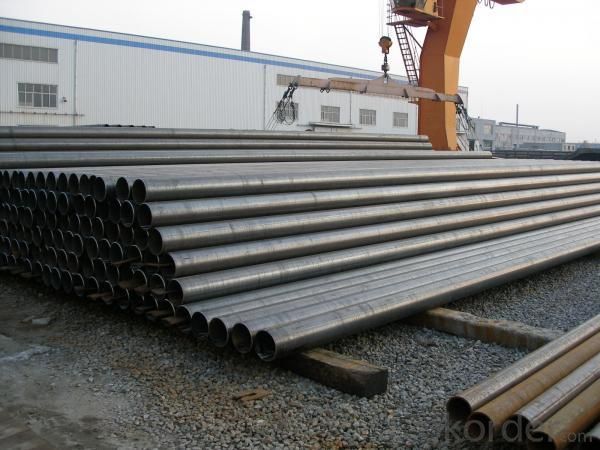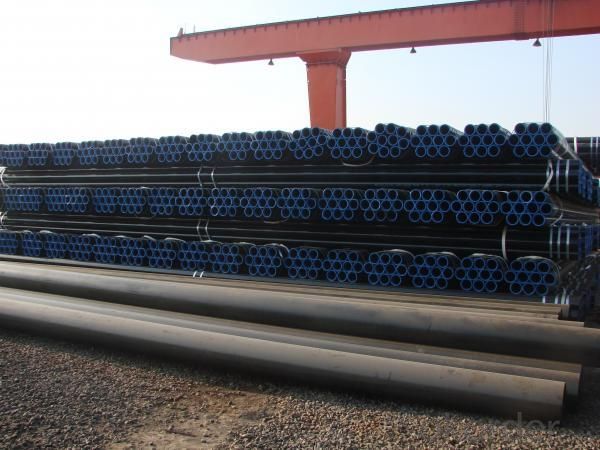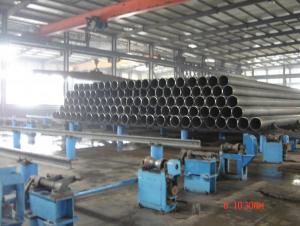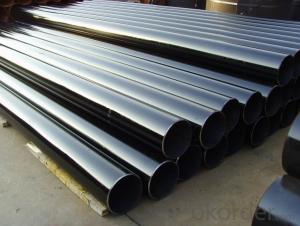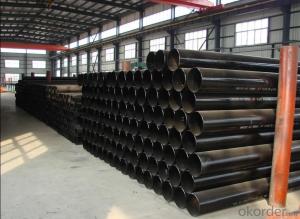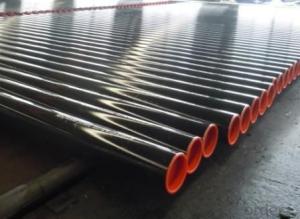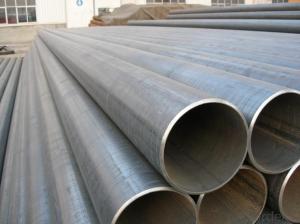Line Pipes API 5L
- Loading Port:
- China Main Port
- Payment Terms:
- TT or L/C
- Min Order Qty:
- 50MT m.t.
- Supply Capability:
- based on order m.t./month
OKorder Service Pledge
OKorder Financial Service
You Might Also Like
ERW Welded Steel Pipes
Application:
It is widely applied to line pipe and casing and tubing in oil transportation and casing field, and it is used in Low,high pressure liquid and gassy transportation and it is also good Structure pipe (for furniture, window, door, building , bridge, mechanical etc).
Package: bundles with anti-rust painting and with plastic caps
Standard:
API SPEC 5L, API SPEC 5CT, ASTM A53, GB/T9711.1
Steel Grade:
API SPEC 5L: B, X42, X46, X52, X56, X60, X65
API SPEC 5CT: J55, K55, N80, L80-1
ASTM A53: A, B, C
GB/T9711.1:L242、L290、L320、L360、L390、L415、L450
Standard: GB/9711. Mechanical Properties
Standard | Grade | (MPa) | (MPa) | Min(%) |
Yield strength | Tensile Strength | Elongation | ||
GB/T9711.1 | L245 | ≥245 | ≥415 | 21 |
L290 | ≥290 | ≥415 | 21 | |
L320 | ≥320 | ≥435 | 20 | |
L360 | ≥360 | ≥460 | 19 | |
L390 | ≥390 | ≥490 | 18 | |
L415 | ≥415 | ≥520 | 17 | |
L450 | ≥450 | ≥535 | 17 | |
L485 | ≥485 | ≥570 | 17 |
Chemical Composition(%)
Standard | Grade | C | Mn | P | S |
Max | Max | Max | Max | ||
GB/T9711.1 | L245 | 0.26 | 0.15 | 0.030 | 0.030 |
L290 | 0.28 | 1.25 | 0.030 | 0.030 | |
L320, L360 | 0.30 | 1.25 | 0.030 | 0.030 | |
L390, L415 | 0.26 | 1.35 | 0.030 | 0.030 | |
L450 | 0.26 | 1.40 | 0.030 | 0.030 | |
L485 | 0.23 | 1.60 | 0.025 | 0.030 |
Standard: GB/9711.2 Mechanical Properties
Standard | Grade | (MPa) Yield strength | (MPa) Tensile Strength | Min(%) Elongation | ||
|
| |||||
GB/T9711.2 |
| Rt0.5Min | Rt0.5Max | RmMin | Rt0.5/Rm Max |
|
L245 |
245 |
440 |
| 0.80 |
22 | |
L245 | 0.85 | |||||
L290 |
290 |
440 |
| 0.80 | 21 | |
L290 | 0.85 | |||||
L360 |
360 |
510 |
| 0.85 |
20 | |
L360 | 0.85 | |||||
L415 |
415 |
565 |
| 0.85 |
18 | |
L415 | 0.85 | |||||
L450 | 450 | 570 | 535 | 0.87 | 18 | |
L485 | 485 | 605 | 570 | 0.90 | 18 | |
Chemical Composition (%)
Standard | Grade | C | Mn | P | S | V | Nb | Ti | CEV |
Max | Max | Max | Max | Max | Max | Max | Max | ||
GB/T9711.2 | L245NB | 0.16 | 1.1 | 0.025 | 0.020 | - | - | - | 0.42 |
L290NB | 0.17 | 1.2 | 0.025 | 0.020 | 0.05 | 0.05 | 0.04 | 0.42 | |
L360NB | 0.20 | 1.6 | 0.025 | 0.020 | 0.10 | 0.05 | 0.04 | 0.45 | |
L415NB | 0.21 | 1.6 | 0.025 | 0.020 | 0.15 | 0.05 | 0.04 | - | |
L245NB, L290NB |
0.16 |
1.5 | 0.025 | 0.020 |
0.04 |
0.04 |
- |
0.4 | |
L360NB | 0.16 | 1.6 | 0.025 | 0.020 | 0.05 | 0.05 | 0.04 | 0.41 | |
L415NB | 0.16 | 1.6 | 0.025 | 0.020 | 0.08 | 0.05 | 0.06 | 0.42 | |
L450NB | 0.16 | 1.6 | 0.025 | 0.020 | 0.10 | 0.05 | 0.06 | 0.43 | |
L485NB | 0.16 | 1.7 | 0.025 | 0.020 | 0.10 | 0.06 | 0.06 | 0.43 |
Standard: ASTM A53 Mechanical Properties
Standard | Grade | (MPa) | (MPa) |
Yield strength | Tensile Strength | ||
ASTM A53M | A | 205 | 330 |
B | 240 | 415 |
Chemical Composition(%)
Standard | Grade | C | Mn | P | S | V | Ni | Cu | Cr | Mo |
Max | Max | Max | Max | Max | Max | Max | Max | Max | ||
ASTM A53M | A | 0.25 | 0.95 | 0.05 | 0.045 | 0.08 | 0.4 | 0.5 | 0.4 | 0.15 |
B | 0.30 | 1.20 | 0.05 | 0.045 | 0.08 | 0.4 | 0.5 | 0.4 | 0.15 |
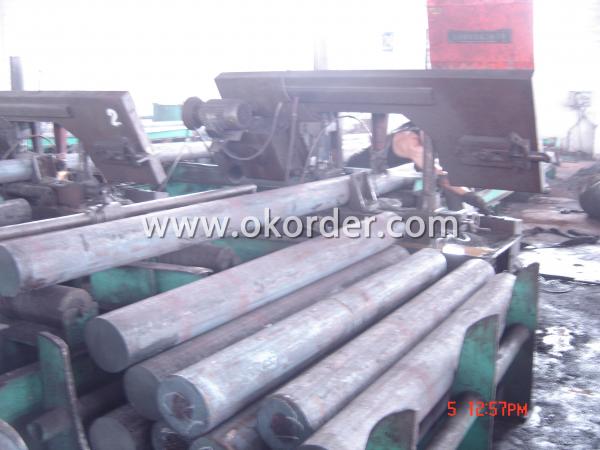
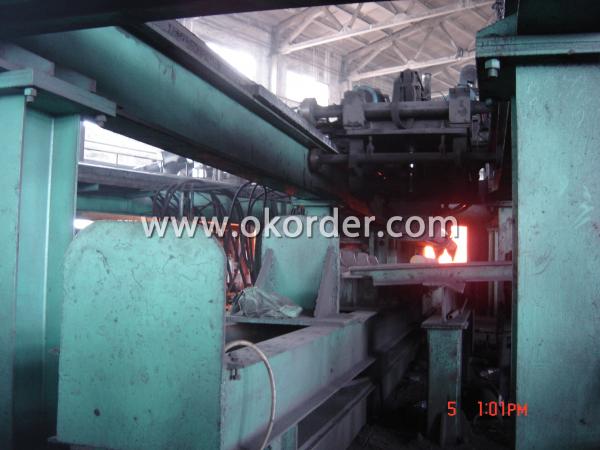
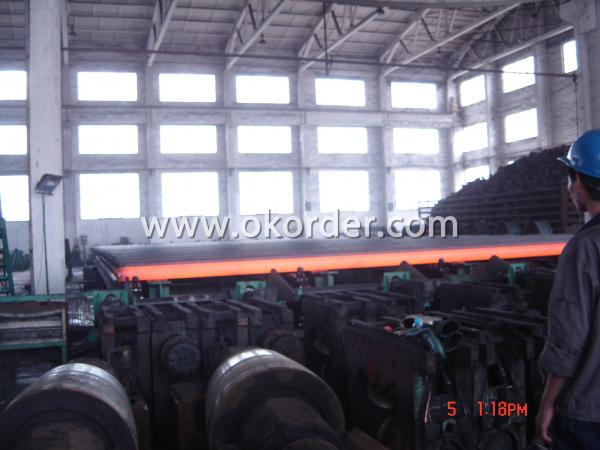
- Q: What's the material of Q325 steel pipe?
- In terms of deoxidation methods, F, B, Z can be expressed as boiling steel, flat killed steel, killed steel and boiling steel. They are deoxidized steel, which is of poor plasticity and toughness. Welded joints made of this material are susceptible to cracks when subjected to dynamic loads. Should not work at low temperatures, sometimes hardening. In contrast, calming steel is excellent and uniform, with good plasticity and toughness.
- Q: Are steel pipes suitable for underground chemical transport?
- Steel pipes are generally considered suitable for underground chemical transport due to their high strength and durability. Steel pipes can withstand the pressure and weight of the soil above them, making them resistant to damage or collapse. Additionally, steel pipes are corrosion-resistant, which is crucial when transporting chemicals that may react with or corrode other materials. They are also able to handle a wide range of temperatures, making them suitable for transporting chemicals that may require specific temperature conditions. However, it is important to consider the specific chemical being transported and consult with experts in chemical engineering or pipeline design to ensure that the steel pipes are compatible with the chemical and that any necessary safety measures are in place.
- Q: What does "spiral welded steel pipe" DN325*10 mean?
- Spiral welded steel pipe with nominal diameter of 325mm and wall thickness of 10mm
- Q: How do steel pipes handle vibrations?
- Steel pipes are known for their ability to handle vibrations effectively. Due to their strong and rigid nature, steel pipes can withstand various types of vibrations, including mechanical vibrations and seismic activities. The resilience of steel pipes is attributed to their structural integrity and strength. Steel pipes have high tensile strength, which enables them to resist deformation or breakage when subjected to vibrations. They are also resistant to fatigue, meaning they can endure repeated vibrations without experiencing any significant damage. This makes steel pipes ideal for applications that involve constant or cyclic vibrations, such as in industrial settings or for transportation of fluids through pipelines. Moreover, steel pipes have the advantage of being able to dampen vibrations due to their mass. The weight of the steel pipe helps absorb and dissipate the energy produced by vibrations, preventing excessive movement or oscillation. This damping effect contributes to the overall stability and durability of the pipe system. To further enhance the ability of steel pipes to handle vibrations, various measures can be taken. These may include the use of vibration isolators or dampers, which are devices designed to reduce the transmission of vibrations from the surrounding environment. Additionally, proper installation techniques and regular maintenance can help ensure that steel pipes continue to perform optimally under vibration-prone conditions. In summary, steel pipes are well-suited to handle vibrations due to their strength, resistance to fatigue, and ability to dampen vibrations. Their robustness and durability make them a reliable choice for applications where vibrations are a concern, ensuring the safe and efficient transport of fluids or materials.
- Q: What is the weight of a steel pipe?
- The weight of a steel pipe can vary depending on its size, length, and thickness. To determine the weight, you would need specific measurements of the pipe.
- Q: Can steel pipes be used for underground oil and gas pipelines?
- Yes, steel pipes can be used for underground oil and gas pipelines. Steel is a commonly used material for such pipelines due to its strength, durability, and ability to withstand high pressure and extreme temperatures. Additionally, steel pipes can be coated or lined with corrosion-resistant materials to protect them from the corrosive properties of oil and gas.
- Q: Can steel pipes be used for conveying slurry and slurries?
- Yes, steel pipes can be used for conveying slurry and slurries. Steel pipes are known for their durability, high strength, and resistance to wear and corrosion, making them suitable for transporting abrasive materials like slurry. Additionally, steel pipes can handle high pressures and temperatures, making them reliable for conveying slurries in various industries such as mining, construction, and wastewater treatment.
- Q: How are steel pipes used in the manufacturing of boilers?
- Steel pipes are used in the manufacturing of boilers as they provide high strength, durability, and resistance to extreme temperatures and pressure. These pipes are used for transporting hot gases and liquids within the boiler system, ensuring efficient heat transfer and preventing any leaks or failures.
- Q: Are steel pipes suitable for oil and petroleum applications?
- Yes, steel pipes are highly suitable for oil and petroleum applications. They possess excellent strength, durability, and resistance to corrosion, making them ideal for transporting and storing oil and petroleum products. Steel pipes can withstand high pressure and extreme temperatures, ensuring the safety and efficiency of oil and petroleum operations.
- Q: How are steel pipes used in agriculture?
- Steel pipes are commonly used in agriculture for a variety of purposes, such as irrigation systems, water supply lines, and drainage systems. These pipes are durable, resistant to rust and corrosion, and can withstand high pressure, making them ideal for transporting water and other fluids across farmland. Additionally, steel pipes are used to construct structures like greenhouses, fencing, and livestock enclosures, providing strength and stability to support agricultural operations.
1. Manufacturer Overview
| Location | Tianjin, China |
| Year Established | 2004 |
| Annual Output Value | 250,000Tons |
| Main Markets | Europe; South America; Americas;etc. |
| Company Certifications | API 5L;API 5CT;ISO 9001:2008 GB/T 19001-2008;ISO 9001:2008 |
2. Manufacturer Certificates
| a) Certification Name | |
| Range | |
| Reference | |
| Validity Period |
3. Manufacturer Capability
| a) Trade Capacity | |
| Nearest Port | Tianjin |
| Export Percentage | 50% - 60% |
| No.of Employees in Trade Department | 1000-2000 People |
| Language Spoken: | English; Chinese; Spanish |
| b) Factory Information | |
| Factory Size: | Above 70,000 square meters |
| No. of Production Lines | Above 8 |
| Contract Manufacturing | OEM Service Offered; Design Service Offered |
| Product Price Range | Average |
Send your message to us
Line Pipes API 5L
- Loading Port:
- China Main Port
- Payment Terms:
- TT or L/C
- Min Order Qty:
- 50MT m.t.
- Supply Capability:
- based on order m.t./month
OKorder Service Pledge
OKorder Financial Service
Similar products
Hot products
Hot Searches
Related keywords
